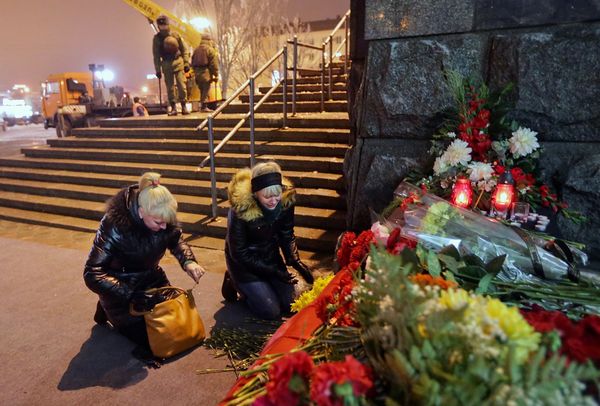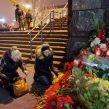
Terrorist Attacks in Russia Symptom of Country’s Political Stagnation
Publication: Eurasia Daily Monitor Volume: 11 Issue: 1
By:

Two explosions shook the city of Volgograd in Russia’s Volga region on December 29 and December 30, killing 34 people and injuring more than 70. The first attack hit the city railway station while the second hit a city trolleybus (https://www.interfax.ru/russia/news/349933). As one attack followed after another unimpeded, the wave of violence cast doubt on the Russian government’s ability to provide public safety. On January 2, just days after the attacks, a source in the Russian security services told the Interfax news agency that the two purported male suicide bombers came from the North Caucasus. The source said the male attackers “were not trained in the Volgograd region, but came to the region presumably with the specific aim of destabilizing the situation and blowing themselves up to cause the greatest possible number of dead and wounded.” Earlier, the authorities had said that one of the suicide bombers was a female (https://www.interfax.ru/russia/txt/350031).
The suicide bomber at the railway station was preliminarily identified as an ethnic Russian convert to Islam, Pavel Pechyonkin, who had ties to the Buinaksk jamaat in Dagestan. The second suicide bomber was also described as a person of “Slavic appearance” (https://www.mk.ru/incident/article/2013/12/30/966556-vokzal-v-volgograde-vzorval-zhitel-mariy-el-pavel-pechenkin.html).
Confusion and contradictory information was particularly rife following these latest terrorist attacks in Russia. For example, one analysis of the video recording from the scene of the attack at the railway station said there may have been no suicide bomber at all, since the explosion is seen far away from the person who allegedly blew himself up (https://kavpolit.com/a-byl-li-smertnik/). Multiple irregularities in news reports on the attacks and the Russian government’s previous ability to reap political benefits from terrorist attacks led some observers to regard the latest attack as another possible Russian government trick. However, the rapid approach of the Winter Olympic Games in Sochi make it highly unlikely that the Russian government was involved in the latest attacks, given that such attacks undermine Moscow’s ability to hold the Olympics in a safe environment.
At the other end of the spectrum of opinion, the well-known Russian analyst Yulia Latynina asserted that there was no link between the attacks in Volgograd and the Olympics in Sochi. Rather, she said the attacks were the work of Islamic radicals targeting the country around the time of New Year’s Eve, which they regard as a “pagan” celebration (https://echo.msk.ru/programs/code/1231398-echo/).
However, whether or not it was the original intent of the masterminds of the attacks in Volgograd, the attacks were perceived as a direct threat to the Sochi Winter Olympics. According to the press service of the Russian defense ministry, Defense Minister Sergei Shoigu, during a telephone conversation with US Defense Secretary Chuck Hagel on January 4, expressed readiness to intensify cooperation between the two countries, “especially, in the run-up to the Winter Olympic Games in Sochi” (https://function.mil.ru/news_page/country/more.htm?id=11887771@egNews). On January 3, President Vladimir Putin and Prime Minister Dmitry Medvedev visited Sochi, skied near the Olympic sites and drank wine, in a thinly disguised attempt to boost the credibility of the Russian government’s defenses in and around Sochi (https://www.interfax.ru/russia/txt/350112).
The perpetrators of the Volgograd attacks appear to have had several key considerations in mind when they attacked this city on the Volga. First, they realized that even if an attack was carried out relatively far away from Sochi, it would still receive much attention worldwide because of increased media attention in the run-up to the Sochi games. Second, the attackers staged the attacks well before the start of the games in order to have a lengthy period of news coverage devoted to the threat to the Olympics and related topics. Third, they realized that the Russian security services are unlikely to expect two consecutive attacks in the same city. Given these three conditions, the organizers of the attacks struck in an area in which they probably felt most at ease in terms of accessibility and familiarity. Volgograd lies along one of the principal ground transportation routes from Dagestan to Moscow.
A bombing that took place several days before the Volgograd attacks in Pyatigorsk, located south of Stavropol region, faded in the news following Volgograd. On December 27, three people were killed when a car loaded with explosives detonated near the regional road police headquarters. The explosive power of the improvised explosive device (IED) was estimated at 50 kilograms of TNT. Following the attacks in Volgograd, from January 1 onwards, additional military, police and Cossack patrols were deployed to provide protection to the critical infrastructure in Stavropol region (https://ria.ru/defense_safety/20140103/987780040.html). Unlike Volgograd region, Stavropol shares an administrative border with Krasnodar region, where the city of Sochi is located.
Meanwhile, the Russian security services optimistically and predictably reported after the terrorist attacks that they had detained in Volgograd over 700 people for various administrative crimes, as well as 12 criminals who were on a wanted list and 70 others suspected of criminal acts (https://www.interfax.ru/russia/news/350027). These claims are likely to be followed by reports, probably sometime in January, that the Russian security services killed the insurgents suspected of having organized the attacks in Volgograd. Recent reports from Volgograd indicated that a witch-hunt is under way, in which North Caucasians are quite predictably the scapegoats despite the fact that the terrorists may not necessarily be ethnic North Caucasians (https://www.novayagazeta.ru/society/61684.html).
For Putin’s regime and Russia, the wave of terrorist attacks means that the country is back to square one after years of fighting the insurgency in the North Caucasus. The Russian government’s brutal tactics in the North Caucasus and the gradual drift of Putin’s personalistic regime toward lifelong rule preclude easy solutions to the terrorist threat in the country. The Olympics in Sochi are unlikely to cause any significant changes in Russia’s domestic politics. Instead, the games will simply underscore the country’s existing problem.




